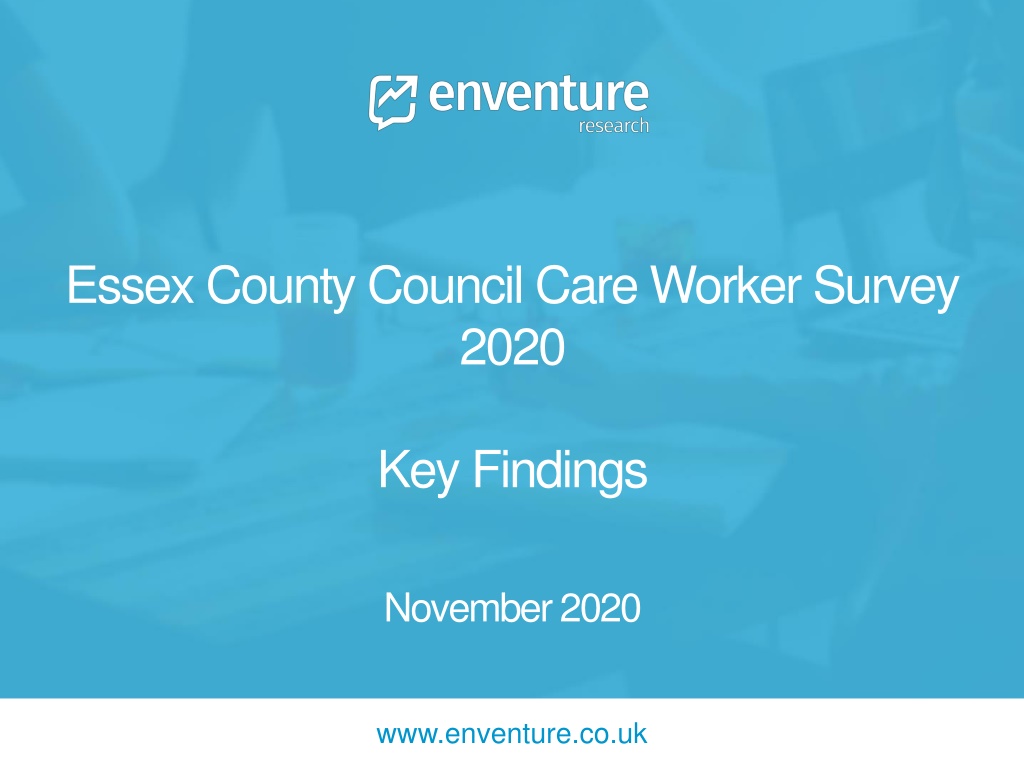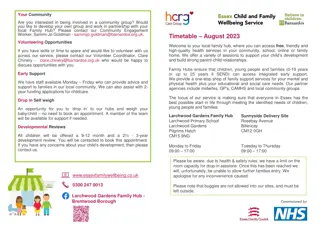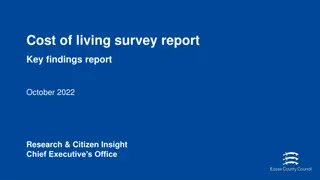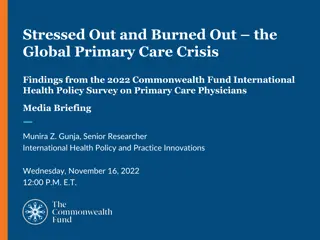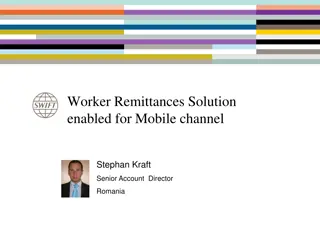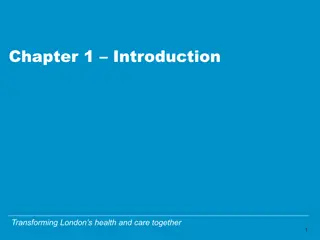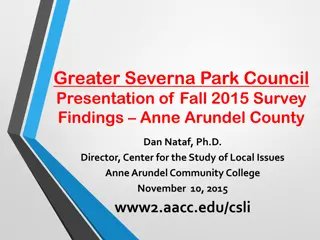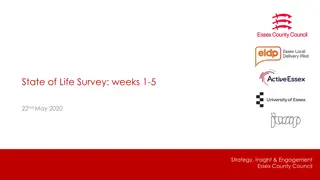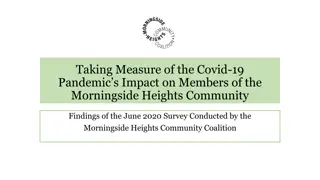Essex County Council Care Worker Survey 2020 Key Findings
The Essex County Council Care Worker Survey 2020 provides insights into care workers' motivations, likes and frustrations, roles, future intentions, training, and technology usage. Enventure Research conducted the survey to inform ECC's workforce strategy. The methodology involved an online survey accessible on various devices, with 393 responses received. The survey includes clarifications on response options and subgroup analysis. The respondent profile reveals details such as age groups, gender distribution, and work experience in the care profession.
Download Presentation

Please find below an Image/Link to download the presentation.
The content on the website is provided AS IS for your information and personal use only. It may not be sold, licensed, or shared on other websites without obtaining consent from the author. Download presentation by click this link. If you encounter any issues during the download, it is possible that the publisher has removed the file from their server.
E N D
Presentation Transcript
Essex County Council Care Worker Survey 2020 Key Findings November 2020 www.enventure.co.uk
Background Survey aims to provide ECC with up-to-date understanding of care workers : Motivations to enter, remain or leave sector Likes and frustrations of working in sector Current roles and future working intentions Training and development Usage of digital products and technology Survey to inform workforce strategy to ensure high quality services continue to be provided to residents Enventure Research commissioned to carry out surveys with care workers in Essex Second time survey carried out first in 2019 Questions added this year about the COVID-19 pandemic
Methodology Online survey, formatted for PCs, smartphones and tablets Survey took respondents approx. 15 minutes to complete Email invitations sent to those who had given permission to ECC to be contacted Link promoted on Care Provider Information Hub Promotion via Essex Care Association Prize draw of charity donations Survey live between 2 September and 30 September 393 responses received
Clarifications Some response options have been combined i.e. Yes,definitely and Yes, to some extent to show total Yes Several reasons why responses in charts/tables might not add up to 100%: Respondents might have been able to give more than one answer Only most common responses might be shown Individual percentages are rounded to nearest whole number Responses of between 0% and 0.4% shown as 0%. Subgroup analysis undertaken using statistical testing by provider type, role, and age group amongst others Comparisons with results from 2019 survey All analysis undertaken at 95% confidence level
2020 respondent profile To which of these age groups do you belong? Gender Prefer not to say 2% Male 10% 16-29 14% 30-39 16% 40-49 27% 50+ 39% Female 88% Prefer not to say 4% Approximately how long have you worked in the care profession? 84% were White British, 5% White Other, 7% BAME Less than a year 11% 70% had worked for only one organisation in last 3 years 1-3 years 12% 3 or more years 77%
Respondents roles in 2020 Which of the following categories best describes your current role? Which client groups do you work with in your current role? Which of the following categories best describes your current role? Older people (aged 65+) 62% Carer 46% Domiciliary 45% Management 25% Learning disabilities 50% Supervisor 6% End of life care 25% Office based and care providing Residential 41% 6% People with Physical Sensory Impairments (PSI) 17% Office based and non care providing 4% In-house trainer 0% Reablement 11% Other 11% Finance 0% Children and families 2% Other 11% Prefer not to say 2% Other 7% Prefer not to say 2%
Motivations for joining the profession Making a difference to people s lives is once again the most common motivation to working in the profession What first attracted you to the care profession? I wanted to make a difference to people's lives 86% 80% 12% I needed a job 12% 12% I was able to get work when I wanted 9% 2020 2019 I saw an advert and thought it looked like something I'd be good at 10% 12% I liked the idea of travelling to clients' homes (if applicable) 9% 6% 6% Other 8% 2% Don't know/can't remember 1% Base: All (2020: 393; 2019: 392)
Enjoyable aspects Making a difference to people s lives and the variety of the role are again the most common factors What do you enjoy about working in the care profession? Making a difference to people's lives 91% 91% 48% I enjoy the variety of the role 54% 19% I can work the hours I want to 15% 2020 2019 I enjoy travelling to clients (if applicable) 14% 14% 3% 3% Other I do not enjoy anything about working in the care profession 1% 0% Base: All (2020: 393; 2019: 392)
Frustrations Pay is again by far the biggest frustration about working in the profession Which, if any, are your biggest frustrations about working in the care industry? 67% Pay 60% Half (51%) earn less than 10 an hour 21% Hours 21% 21% Communication 21% 13% 91% said their pay from their care role was primary source of income Leadership 12% 2020 9% Client behaviour 6% 2019 26% have zero hours contracts, higher than last year (15%) 7% Travel (if applicable) 10% NO 7% Career development 10% 46% work 40+ hours per week 5% Lack of training 5% 9% Other 12% None, I do not have any frustrations 14% Base: All (2020: 393; 2019: 392) 17%
Future intentions One in ten (9%) intend to leave profession in next 12 months, same as last year Do you intend to do any of the following in the next 12 months? Move into an alternative role within the care sector 13% 13% Move into an alternative role in another industry/leave the care profession 9% 9% Move into the same role in a different organisation 8% 6% 2020 2019 Move into an alternative role in the same organisation 8% 12% 6% Retire 4% 64% 65% None of the above Base: All (2020: 393; 2019: 392)
Reasons for changing roles Better pay is again the biggest factor for leaving roles, but there are others If you are considering leaving your role/job, which of the following, if any, would help you consider remaining in your current position? 71% Better pay 67% 51% Feeling more valued 39% More/better employee benefits 32% 32% 25% Better career progression 33% 2020 2019 Better 24% 23% supervision/management 14% More training 19% 4% Other 10% 10% None of the above 15% Base: Those considering leaving (2020: 119; 2019:124)
Feeling valued Feeling valued by ECC, health professionals and general public has fallen since last year Overall, do you feel valued in your current role by the following? 96% 96% 94% 94% 94% 94% 84% 83% 72% 72% 68% 66% 55% 48% By your employer By service users By service users' families or friends By colleagues By Essex County Council/social services By health professionals By the general public Total Yes 2020 Total Yes 2019 Base: All (2020: 393; 2019: 392)
Feeling valued Better package/more perks most common, but there are other important factors relating to feeling valued by public and employers Which of the following, if any, would make you feel more valued in your role? Better employment package/more perks to the job 42% 48% 42% Improved perception/image of care 39% More appreciation/recognition by my employer 40% 37% Access to more training opportunities 18% 21% 2020 2019 More appreciation/recognition by my clients or their families 17% 19% 17% Clearer progression routes 24% 12% Other 7% 14% 14% Nothing Base: All (2020: 393; 2019: 392)
Opinions about organisations High levels of positivity about organisations worked for, but being listened to has fallen since last year Do you feel the organisation you work for 93% 93% 92% 91% 91% 89% 87% 86% 85% 85% 84% 80% is supportive? is flexible to your is efficient (e.g. processes are clear and followed)? is caring? deals effectively with any issues you raise? listens to your ideas and takes them seriously? needs? Total Yes 2020 Total Yes 2019 Base: All (2020: 393; 2019: 392)
Bullying and discrimination Some cases of bullying and discrimination like last year, but usually this is reported and dealt with Have you experienced or seen bullying or discrimination in the last 12 months whilst at work? 15% 18% Yes 76% 74% No 2020 Prefer not to say 7% 5% Did you or someone else report the incident within your organisation? 2019 3% 3% Don't know 84% Yes 70% 9% No 10% 57% said it was dealt with effectively within their organisation, 22% said it was not 2020 2019 3% Prefer not to say 8% 3% Don't know 11% Base: Varies
Training and development There were high levels of satisfaction with training provided in roles When you started in your current role, do you feel that your induction training was sufficient for you to be able to carry out your job role effectively? Are you able to undertake the training you want or need in your role? 86% 87% Yes 86% 88% Yes 2020 2019 6% 6% No 10% 7% 2020 2019 No 7% 7% 5% 5% Don't know Don't know 45% said their supervisor had not talked to them about career progression and opportunities in last 12 months, an increase since last year (40%) 63% had completed/ achieved the Care Certificate 73% held a relevant Social Care qualification Base: Varies
Digital products and technology Many still do not use digital products and technology in their roles Have you used any of the following products in your role? Frequently mentioned benefits Gives clients access to things they like (e.g. music, activities) Better support/improved quality of care for clients Saves time/more efficient/faster reporting Real time updates/up to date information % Rostering software 18% 15% 20% Smart speakers (e.g Alexa/Google) 17% 18% 18% 17% 13% Call monitoring software 15% 18% 2020 2019 Medication management software/apps 10% 8% 5% 2% Other None of the above 58% 60% Base: Varies
COVID-19 pandemic Employees have generally felt supported by their employers during the pandemic, although many don t know how to access mental health support Has PPE been provided to you by your employer throughout the COVID-19 pandemic when it has been required? If you need it, do you have access to support and help for your wellbeing through your employer? Overall, how well supported by your employer do you feel during the pandemic? No 8% Not Throughout 86% supported 14% Don't know 18% Don't know 2% Prefer not to say 2% Yes 72% Sometimes 12% Supported 84% Not at all 1% N/A 1% Base: All (2020: 393; 2019: 392)
What does ECC do well? What, if anything, do you think Essex County Council does well to support the care sector in Essex? Providing information/advice/regular updates 26% Generally supportive/regular contact 20% Ensuring access to appropriate PPE 15% Communication/information sharing 7% Good education/training 6% Providing additional funding/financial support 6% NO Supporting service users/acting promptly on issues 5% Offering antibody/antigen testing 1% Don't know/nothing 40% Base: 171
What can ECC do better? What, if anything, could Essex County Council do better to support the care sector in Essex? Better communication/support/be more responsive 21% Increase pay/pay for travel time 17% Protect staff - ensure adequate PPE/testing available 15% 11% Value/appreciate staff - recognise and promote the Provide clear information/guidelines 8% Better support for service users 8% More benefits/perks/discounts 7% 5% More flexibility/less red tape 5% Provide more funding/financial support NO Provide tailored advice/have a named contact person 4% Provide more training/events 4% ECC needs to do more (nothing specific mentioned) 3% Recruit more carers/support recruitment 2% 20% Nothing/don t know Base: 210
Younger care workers key differences Those aged 16-29 were more likely than other age groups to: Work as a carer for a domiciliary provider Say hours were a frustration with working in the profession Have considered moving into same role in different organisation in last 12 months Amongst those considering leaving their role, say better career progression would make them reconsider Earn between 8.00 and 8.99 an hour and less likely to earn 11.00 an hour Have zero hour/flexible contracts Say a better employment package or more perks and clearer progression routes would help them feel more valued in their role Not have any relevant social care qualification
Residential provider key differences Those who worked for residential providers were more likely than domiciliary to: Prefer to work with people with learning disabilities Have been in their current role for three or more years Have permanent contracts Say the organisation they work for deals effectively with any issues they raise Say that the pandemic had had an overall negative impact on their mental health
Domiciliary provider key differences Those who worked for domiciliary providers were more likely than residential to: Prefer to work with older people Enjoy working the hours they want and travelling to clients Say travelling was a frustration Earn between 9.00 and 9.99 an hour Have zero hours/flexible contracts Work part-time hours Completed the Care Certificate Say that their supervisor had talked to them about career progression and opportunities in the last 12 months
Carers and management key differences Carers were more likely to: Join the profession as needed a job Enjoy making a difference to people s lives Say leadership was a frustration Have been in role for less than a year Earn between 8.00 and 8.99 an hour Have zero hours/flexible contracts Say a better employment package or more perks would make them feel more valued Not know if they have access to support and help for their mental wellbeing through their employer Management were more likely to: Have worked for only one organisation in last 3 years Have moved into an alternative role in organisation Had been in current role for 3+ years Earn 11.00 or more per hour Have permanent contracts Work 30+ hours per week Feel valued by employer and by health professionals Think the organisation they work for is efficient, caring and listens to them Feel supported by employer in the pandemic
Summary of conclusions As also seen last year, making a difference to people s lives is key attraction to working in profession and many continue to find this a rewarding aspect Pay continues to be biggest source of frustration for those working in the care profession, even more than last year Feeling valued continues to be of high importance and feeling underappreciated coupled with a negative image of the sector are sources of frustration to many There is a lot of pressure in the profession and many work long hours Usage of zero hours/flexible contracts is increasing and younger people in care roles are likely to have them General feeling that sufficient training is provided for most, although there is perhaps less communication with supervisors this year about career progression The majority do not use digital products and technology in their role. Most felt supported by employer during pandemic and had been provided with adequate PPE to carry out role A significant proportion do not know how to access support and help for their wellbeing through their employer
